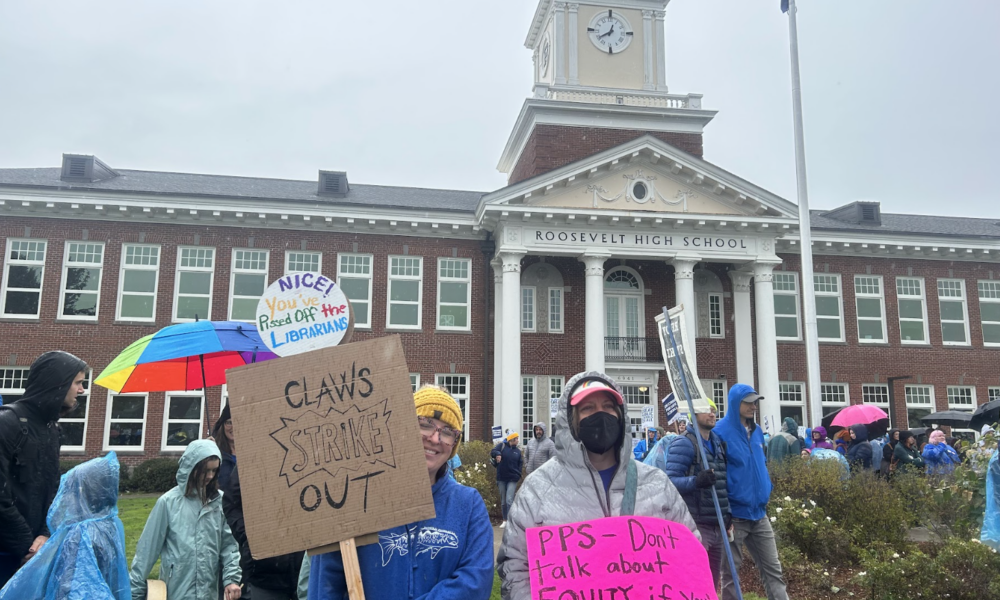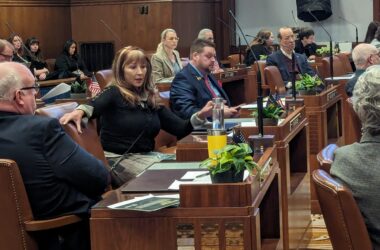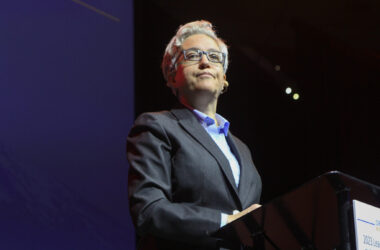With Portland Public Schools teachers striking for the first time in history, Oregon’s top elected officials urged the union and district leaders to bargain in good faith.
The strike started on Wednesday, with about 3,500 teachers joining the work stoppage in the state’s largest school district, serving more than 40,000 students. Educators are on strike for better pay and working conditions, including smaller classroom sizes and more time to prepare lessons.
Gov. Tina Kotek said on Tuesday she dispatched her staffers to talk to leaders on both sides. She also has talked to school district and union leaders directly about the impasse, Kotek said on X, formerly known as Twitter.
On Wednesday, U.S. Sens. Jeff Merkley and Ron Wyden said they support the right of teachers to strike and urged the school district and union to reach an agreement that benefits students and teachers alike for the long-term future.
“Over the last three years, our educators have strived to maintain a quality, equitable education program for our children through the enormous difficulties of the COVID-19 pandemic,” the two Democratic senators said in a joint statement. “They have been underpaid and overstressed, and we strongly affirm our support for Portland’s educators exercising their right to strike for an equitable collective bargaining agreement.”
State elected officials usually steer clear of regional labor disputes in local agencies. But the scope of the Portland Public Schools strike is significant. A new contract that ends the strike could potentially translate into benefits for students in the classroom and educators.
“We urge leadership from both the Portland Association of Teachers and Portland Public Schools to continue working in good faith toward an agreement that addresses a number of key issues, including class size, salaries and benefits, safety in the classroom, stronger equity programs, and expanded services for early learning and special education,” Merkley and Wyden said.
At the same time, all those items have a cost. In a press conference on Monday, Kotek said the school district needs to put more money into its proposal, but not take financial risks. The two sides are about $200 million apart in their proposals, with the union pushing for more for teacher pay, more lesson planning time and smaller classroom sizes, The Oregonian/Oregonlive reported.
“I think it would be irresponsible for the Portland Public Schools to commit to an agreement that will create a gigantic cliff at the end of the biennium,” Kotek said. “I do expect them to put more money on the table and prioritize classroom resources first over administration. But I don’t believe there’s $200 million.”
Educators rally and seek action
For now, it’s unclear what impact, if any, elected officials will have on the outcome. But for striking teachers, support from influential Oregonians can make the difference, said Debbie Nicholson, a longtime Portland Public Schools teacher who retired in June after 27 years with the district.
Nicholson was among the more than 250 educators, parents, students and other supporters who rallied outside of Roosevelt High School in north Portland on Wednesday afternoon. Nicholson worked primarily as a teacher at James John Elementary, and then for seven years as a school climate specialist, helping with student behavioral issues and training and coaching other teachers.
Nicholson said she was dispirited that state and local leaders have not spoken out more strongly in support of teachers and their needs. During past contract negotiations, she said, strikes were averted in part because teachers had more support from state and local leaders.
“We’d always had so much support from the city government, as well as state government, and this year that doesn’t seem to be the case,” Nicholson said. “The city government is in their own crises I think.”
She came back during the current school year as a substitute teacher in various Portland schools and said it illuminated for her the unprecedented need across the district.
“It’s so hard to teach,” Nicholson said. “(There are) too many students and too much disruptive behavior.”
Nicholson said the strike is not just a response to post-pandemic changes in student behavior and missed class time, but is a long time coming. She said too many teachers are working too hard for too little and that many teachers cannot afford to buy homes in the neighborhoods where they teach.
“Fifteen years ago, we took – the teachers took – a pay cut and we worked for free for 10 days to help settle the contract. That’s a big chunk of change you know,” she said. “We took all sorts of other concessions. We didn’t take a big pay raise so we could keep our benefits.”
Oregon Capital Chronicle is part of States Newsroom, a network of news bureaus supported by grants and a coalition of donors as a 501c(3) public charity. Oregon Capital Chronicle maintains editorial independence. Contact Editor Lynne Terry for questions: [email protected]. Follow Oregon Capital Chronicle on Facebook and Twitter.
STORY TIP OR IDEA? Send an email to Salem Reporter’s news team: [email protected].











